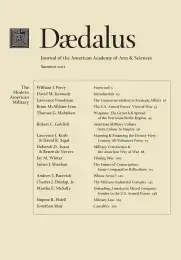Military Law
Military justice–the system for ensuring good order and discipline within the armed forces– remains the military legal establishment’s bedrock activity. Court-martial and nonjudicial punishment rates are down, but major breaches of discipline arising both on deployment and at home continue to demand attention by civilian leaders, commanders, and judge advocates. Important legal and public policy issues remain to be resolved with respect to the limited availability of review by the Supreme Court, the exercise of court-martial jurisdiction over civilians, the use of military commissions to prosecute unlawful belligerents, increasing reliance on high-tech weaponry, and repeal of the Don’t Ask, Don’t Tell policy. As technology, national policy, and expectations of proper treatment (of our own personnel, of civilians, of enemies of various kinds) evolve, this will be an increasingly dynamic era for law and legal institutions in the realm of national defense.
Two recent events dramatically highlight the complexity of Americans’ vision of military law. In one, Congress enacted legislation to make the senior uniformed lawyers of the Army, Navy, and Air Force three-star officers.1 In the other, the Chief Justice of the United States, writing for himself and three other justices, dismissed military justice as “a rough form of justice.”2
Chief Justice Roberts’s comment was both a disservice to the military and a sign of how easy it is to fall prey to incorrect preconceptions. In fact, he could not have been further from the truth, not only as to courts-martial but as to the role of law in general within the armed forces.
Law plays a powerful role in the conduct of military affairs. Difficult issues lurk, such as the constitutionality of subjecting government contractors and other civilians to courts-martial for offenses committed during contingency operations. But these will be resolved through the orderly and transparent processes of the law and a balance struck between the insistent call of operational needs, on the one hand, and the constraints imposed by the Constitution and laws, on the other. While the tension . . .
